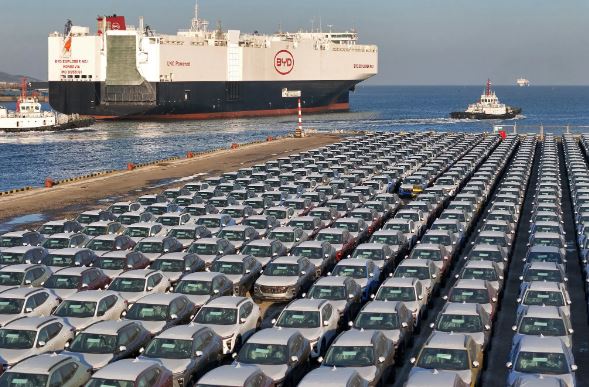The European Union announced on Wednesday that it will impose additional tariffs of up to 38 percent on electric vehicles (EVs) imported from China, aiming to protect the region’s manufacturers from what it deems unfair competition. This move follows President Biden’s recent decision to quadruple U.S. tariffs on Chinese EVs to 100 percent, signaling escalating trade tensions with China over green technology goods.
The decision comes as traditional automakers in Europe and the U.S. face growing competition from Chinese companies focused on EVs with significantly lower cost bases. Unlike U.S. carmakers, many European counterparts are heavily invested in the Chinese market. Consequently, vehicles produced there will also be subject to the higher tariffs, prompting concerns about potential retaliation from China and market disruptions.
The new tariffs, set to take effect on July 4, will increase duties from the existing 10 percent to a range of 17.4 percent to 38.1 percent for leading Chinese manufacturers BYD, Geely, and SAIC. These rates were determined based on the companies’ level of cooperation with European officials who investigated the extent of Chinese government subsidies.
Other automakers producing EVs in China, including European companies with local factories or joint ventures, will face tariffs of 21 percent or 38.1 percent, depending on their cooperation with the investigation. The European Union defended its actions, citing findings that the Chinese EV supply chain heavily benefits from unfair subsidies, posing a significant threat to the EU industry.
China condemned the tariffs as lacking “factual and legal basis” and accused the EU of “weaponizing economic and trade issues.” He Yadong, a spokesperson for China’s Commerce Ministry, stated that the move contradicts previous commitments to strengthen cooperation and could negatively impact bilateral trade relations.
The European Commission’s investigation aimed to determine whether the Chinese government was subsidizing its EV production to sell at artificially low prices in Europe, undermining local competitors.
Currently, 37 percent of all EVs imported to Europe come from China, including models from Tesla, BMW, and Renault’s Dacia. Chinese brands now account for 19 percent of the European EV market. Despite the tariffs, EU officials expressed willingness to engage with China to resolve the dispute and emphasized that the goal was to protect European industry, not to escalate tariffs arbitrarily.
Tesla, which produces its Model 3 and Model Y in Shanghai for the European market, requested individualized tariff calculations. Other companies have nine months to petition for individual reviews, though none had done so by the announcement.
Ursula von der Leyen, President of the European Commission, explained that the tailored tariff approach aimed to reflect the level of damage caused by Chinese subsidies.
China has warned it might retaliate by raising tariffs on European gas-powered cars, agricultural products, and aviation goods. Currently, China applies a 15 percent duty on all imported EVs from Europe, affecting brands like BMW and Volkswagen, which also have significant production in China.
German carmakers, particularly concerned about the potential price increases and retaliatory measures, criticized the EU’s decision. German Chancellor Olaf Scholz highlighted the risks of isolation and customs barriers, suggesting they would ultimately increase costs and impoverish everyone involved.
Economic experts warn that tariffs as high as 20 percent could disrupt trade routes, with the Kiel Institute for the World Economy estimating a potential $3.8 billion reduction in Chinese EV imports to Europe. Higher tariffs might be necessary to counter Chinese manufacturers’ cost advantages, though this could lead to higher EV prices overall due to increased labor and production costs in Europe.
Chinese manufacturers are also expanding into Europe, with BYD planning a factory in Hungary and Chery opening a plant near Barcelona. European countries, eager to attract these investments, see potential job creation and strengthened supply chains as benefits. Meanwhile, European automakers emphasize the need to enhance competitiveness rather than rely on tariffs.
Volkswagen, with extensive operations in China, warned that the tariffs could trigger a damaging cycle of trade conflicts. The new tariffs will be enforced starting next month, with affected companies and the Chinese government having several days to respond before final tariffs are established for a five-year period.

